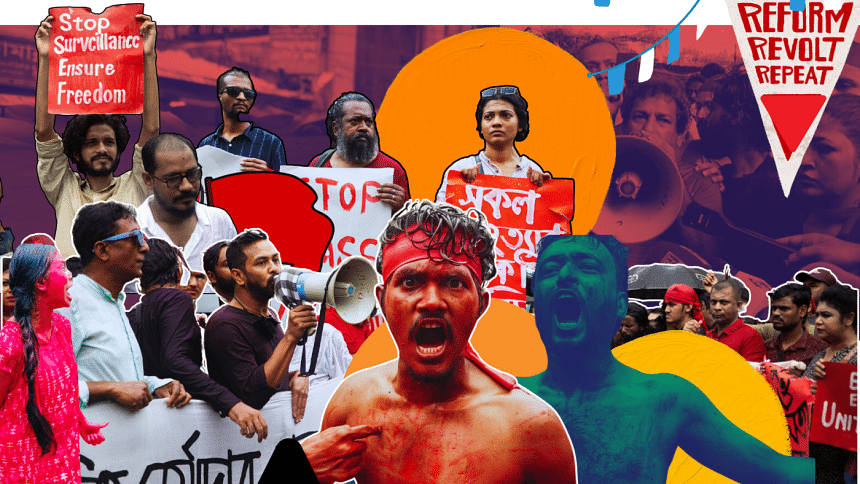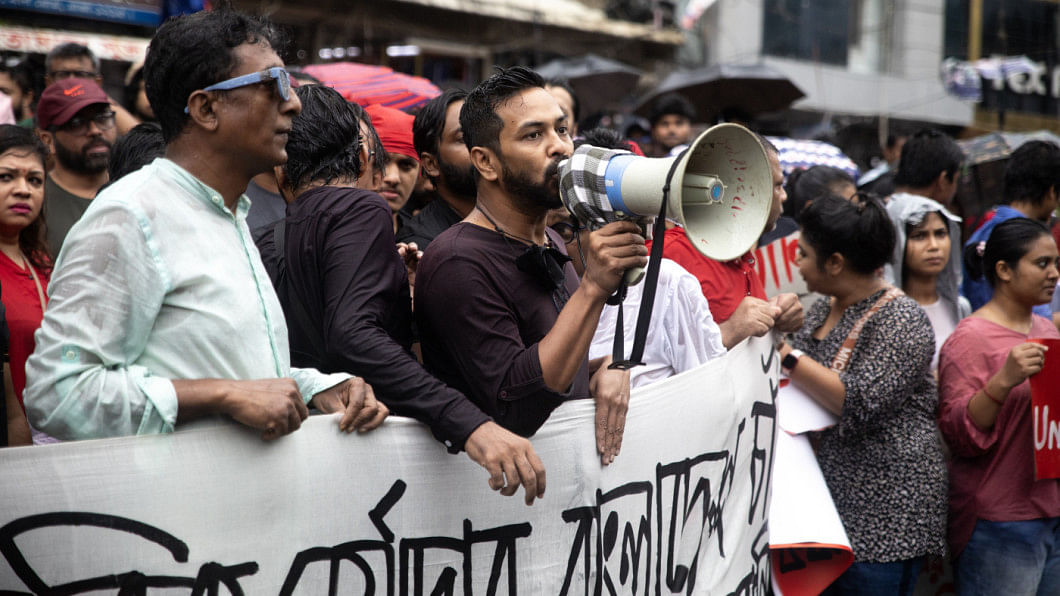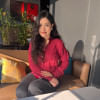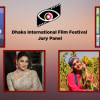How artistes flamed cultural defiance in July

Last year, we witnessed a movement that changed Bangladesh forever. What began as a Quota Reform Movement quickly turned into an uprising, a cry of anguish, and ultimately, a national tragedy. The previous regime tried everything to crush the spirit of the awakening, starting with internet blackouts, mobile network shutdowns, curfews, and fearmongering. However, even silence has a breaking point, and at a certain junction in history, celebrities and cultural activists took to the streets with placards, voices, and an indomitable spirit. When the people saw their favourite actors, musicians, and directors marching in rallies, a new kind of courage manifested itself.
On July 19, 2024, theatre artistes from across Bangladesh united under the banner of 'Bikkhubdho Theatre Kormi'. Groups like Prachyanat, BotTala, Tarua, Opera, Desh Natok, Anushwar, Aranyak Natyadal, and Theatre 52 stood in solidarity. People from other cultural fields also joined. They were searching for a platform to express dissent, and the human chain gave them that space. Writers and activists like Rahnuma Ahmed, Samina Luthfa, Saydia Gulrukh, Kazi Toufiqul Islam Emon, Mohammad Ali Haider, Faiz Jahir, Kazi Roksana, and Bakar Bakul were present. Filmmaker Shankha Dasgupta and actors including Imtiaz Barshon, Mostafa Monwar, Safa Kabir, Shohel Mondol, and Khairul Basar also participated.
"We were following everything closely," said theater activist Bakar Bakul. "When the attacks started, we posted online. But once bullets were fired, we knew that Facebook wasn't enough. We had to act. People from different groups came together through WhatsApp and decided to protest."

"It was Sajjad Sabbir from Opera who first proposed a call for protest against these killings," added theater activist Kazi Roksana Ruma. "We all knew silence in the face of murder was no longer an option. As artistes, we had a responsibility to speak up."
A poster with Abu Sayed's image was made, calling for a protest at Sangsad Bhaban on July 19. But on the evening of July 18, the government imposed a nationwide internet blackout. News of the event spread through word of mouth.
"From the 17th, I couldn't stay home anymore," recalled Safa Kabir. "Students were being killed, and the silence became unbearable." She continued, "I went to the Sangsad Bhaban with friends. Around 7:30am, we saw a burnt car in Gulshan—it was terrifying. As someone who suffers from anxiety and panic attacks, it was overwhelming."
Despite the fear, they made it to the protest site. "We saw artistes there, even senior ones. A street play reenacting Abu Sayed's killing was performed—I had goosebumps," said Safa.
The police tried removing them, citing safety concerns. Eventually, they dispersed. "I couldn't return home. Gulshan was shut down, and I took shelter in Niketan. From the rooftop, people were watching others being chased from both directions," she said.
Bakar Bakul, founder and creative director of Tarua, shared, "We staged a performance titled 'Bullet and Blood'. The night before, a few of us were sitting in our Mohammadpur studio, planning something simple. We decided to use red paint to recreate the final moments of Abu Sayeed and others who were killed. We showed ourselves being repeatedly shot. We repeated that motif throughout the protest. The message was simple: bullets don't silence truth."

Organising the protest near Sangsad Bhaban was not easy as Awami loyalists were nearby. Kazi Roksana Ruma recalled how one of their members was assaulted. "Phones were being searched. We were looking for a mic. A member had one, and changed its battery in public. That drew suspicion from Awami League men in front of Aarong," she said.
"They dragged him behind the building and beat him. I got a call—he was bleeding. We ran to him. They finally let him go, realizing they had crossed a line. His mouth and nose were blood-soaked—he had been kicked and punched. A doctor helped us over the phone. His neck stayed sore for days."
Actor Shohel Mondol, who joined both 'Bikkhubdho Theatre Kormi' and 'Drissho Madhyam Shilpi Shomaj' said, "When an establishment turns its guns on students, staying silent and safe at home is not the right response. Even if I weren't an artiste, I would still have joined the protest. That day in front of Sangsad Bhaban, we saw groups aligned with the former government gathered near Aarong, armed with sticks. Despite the fear, we found strength as human beings. Theatre colleagues, artistes, and people from across the creative community stood united—to raise our voices against injustice."
Throughout its 15-year regime, the fascist government imposed inhumane laws such as the Digital Security Act. It led to massive breaches of freedom of speech, and people were falsely jailed for speaking out.

Director Ashfaque Nipun was known for speaking his mind, even under pressure. He consistently protested against the injustices of the former government. He raised his voice when cartoonist Kishore was arrested, when writer Mushtaq Ahmed died in jail, and when journalist Kajol disappeared. Ashfaque stood out as one of the few media figures who actively resisted oppression.
"I faced regular threats. The police came to my house. During the shooting of 'Mohanagar', officers visited my family homes. Many security agencies took me in and interrogated me as well," said Ashfaque. "When the July Movement began, I wasn't alone anymore."
"When they saw me becoming active in the movement, DB contacted my colleagues and producer. They asked my wife Elita to stop me. My name was on a list—but none of it scared me. I had already been through worse. The whole country was united. The fear barrier had broken. Even memes mocking Sheikh Hasina started circulating. For me, July wasn't about fear—it was about celebration. After 15 years of speaking out, others were finally joining in."
He added, "The true July Movement started around July 14 or 15, when Chhatra League attacked students at Dhaka University. I was probably one of the first to post in support of the students. News channels picked it up, and more people became aware of the social injustice happening in the country."
A new wave of protests emerged. 'Drissho Madhyam Shilpi Shomaj' was formed by artistes uniting against injustice. Filmmaker Akram Khan posted a message in a WhatsApp group for Film Alliance Bangladesh to unite and protest against injustice.
"When I called for action, many joined. It was not just me. We felt the urge to speak out," said Akram. "We decided to support the students' nine-point demands."
The collective included Akram Khan, Amirul Rajiv, Taslima Akhter, Jaheen Faruque Amin, Dhrubo Hasan, Munem Wasif, Azmeri Haque Badhan, Reetu Sattar, Probar Ripon, Tanvir Ahsan, Yasir Al Haq, Amitabh Reza Chowdhury, Piplu R Khan, Krishnendu Chattopadhyay, Sakib Fahad, Tanim Noor, Naim Ul Hasan, Hasan Aether, Elita Karim, Edila Farid Turin, Kabir Ahamed, Tanha Zafreen, and Kazi Roksana Ruma.

On July 30, a private meeting was held with around 20 participants, including members of 'Get Up, Stand Up'. Jaheen Faruque Amin said, "We decided not just to form a human chain. We decided to go ahead with a protest. We drafted a press briefing. There was debate—some artistes with ties to the ruling party wanted us to be less confrontational and wanted to avoid nine-point demands and only call for justice. But we disagreed. We stood fully with the students."
Azmeri Haque Badhan shared, "We each donated Tk 500 to make banners and placards. The youth formed a group of 1,500 overnight, all united under the nine-point demand. But some senior artistes were hesitant to endorse the list publicly. All materials—mic, placards, banners—were distributed. I kept some in my car. That night, I couldn't sleep. I was worried about my father's car. I was worried about my daughter and my parents. But once I gave my speech at the event, all my fears disappeared."
On July 31, they issued a signed statement. MP Ferdous wanted to attend, but was asked not to, since his presence could have resulted in conflict. Later, he and others 'protested' in front of BTV.
On August 1, about 50 to 60 people gathered near Farmgate. Police barred them from the Sangsad Bhaban premises, so they chose Farmgate.

"The Drissho Madhyam team mostly included directors, assistant directors, and new filmmakers, and not stars," said Ashfaque. "At the same time, BTV held a 'star-studded' protest. But intent matters. Our protest had more spirit."
"Despite heavy rain, we tried to return to Sangsad Bhaban. People were scared. But unity made fear bearable. We stayed in Farmgate until noon. Each protest sparked a counter-protest. When we were at Farmgate, a rival group gathered near Krishi Bhaban. We even heard they were heading our way," said Shohel Mondol.
During the protest, actor Asaduzzaman Asad's speech went viral. He spoke clearly and directly about the atrocities.
"When I was heading to Sangsad Bhaban, a police officer stopped me and said I couldn't go that way, because Jamaat had been banned that day. I told him I was a citizen and had every right to walk. He tried to stop me again. Things escalated. Reporters filmed it. Within 15 minutes, the footage went viral. I was being interviewed by every outlet."
"So many celebrities had 'protested', but few had said anything of consequence. I was furious. I thought, this can't go on. If something must be said, it must be said now, without fear."
Raka Noshin, a protester and filmmaker, said, "They were killing so many students. Protesting that is a human duty. But after the movement, I saw women's voices being sidelined. Girls from Rokeya Hall made headlines, yet the focus remained on men."
"Some women may have stayed quiet due to threats. So, I decided to make a documentary called 'July Women' to highlight women's impact in the uprising."

Awami League lobbyists used social media to harass and troll many artistes, especially women.
"People called me an agent. They said I supported BNP or Nur or Hasina, just because of old photos. They cursed me. When I posted, 70 percent of accounts reacted with 'Haha'. These weren't random. They were organised trolls," said Badhan. "Some threatened to kill me. But I never turned off the comments. I've been questioning this society for years. I've built immunity."
Neel Hurerzahan, who had previously worked in government programmes, also faced online abuse.
"I began protesting online while I was abroad. When the internet was shut down, I was shocked. I returned to Bangladesh around July 23 or 24, and joined the protest. I was on the frontlines. The police didn't threaten us directly, but the bullying online was severe. Awami League activists distorted and spread doctored photos of mine."
The nation hoped that after the July protest, Bangladesh would move toward a new era—a united country free from repression. But when corruption is so deeply embedded in every layer of the state, is it truly possible to turn things around in just a year? Is it fair to expect people who were never part of the political system to fix its deepest flaws?
"After the July Uprising, public expectations were very high," said Ashfaque Nipun. "After all, the fascist regime had finally fallen." He added, "The spirit was so pure, no one cared about your religion, hometown, or class. Everyone stood together."
"But as someone who has studied political movements globally, from the French Revolution to Iran to post-WWII Germany, I knew the real work starts after the revolution. We need to work united to bring changes in our country," he said.
Badhan echoed a similar thought. "Yes, of course, it will take some time. Maybe eventually they'll be able to do better," she said.
"These new leaders are not traditional politicians. Political leaders have experience. They've been doing this since they were young. They know how to survive and how to operate systems like these," she explained.
For Bakar Bakul, the issue is even broader than governance or leadership. "Whether it's Awami League, BNP, or Jamaat, people seem to have forgotten that beyond party politics, human rights exist," he said.
He continued, "The state cannot kill its own citizens. But years of political conditioning have blinded many of our so-called intellectuals. They're stuck in a form of intellectual servitude."
Rooted in July, exhibitions and special theatre performances are being staged to honour the movement. 'Drissho Madhyam Shilpi Shomaj' will hold a day-long programme tomorrow, titled "Koilza Kapano 36 Din"—looking to ensure that people remember the brutality of the former government and remain aware of the ongoing extortion, violence, and harassment faced by civilians today. In the face of such challenges, we can only hope that people will unite once more, rise against corruption, and prove that we will not allow our country to be dragged backwards again.

 For all latest news, follow The Daily Star's Google News channel.
For all latest news, follow The Daily Star's Google News channel. 








Comments